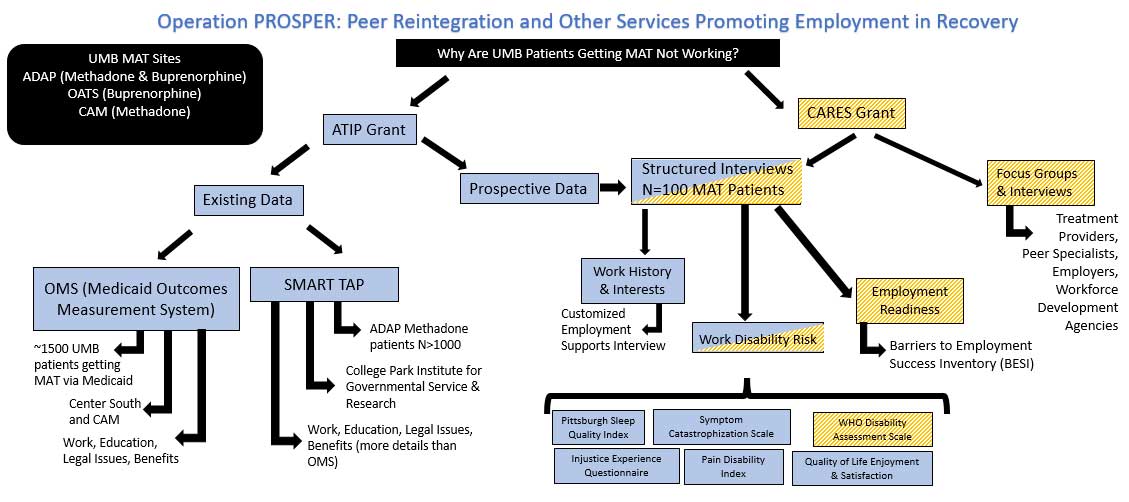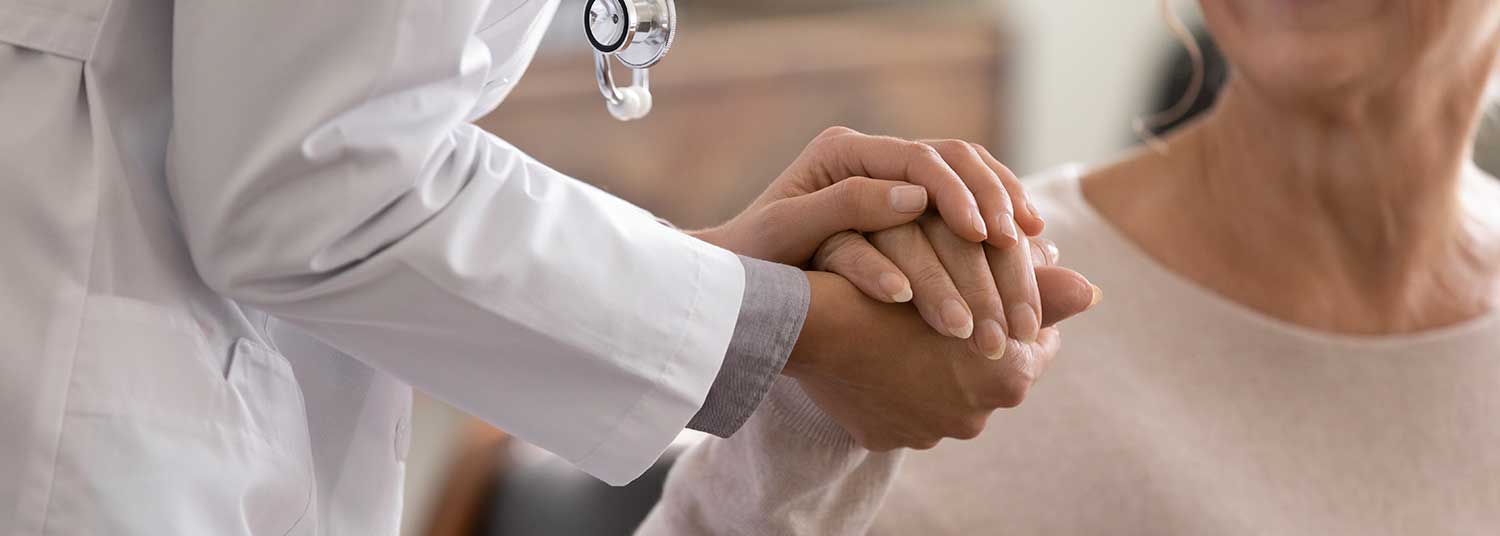Partnering to Reduce Opioid Stigma and Promote Employment in Recovery
FOR MORE INFORMATION
Email the research team for more information or questions about PROSPER projects.
Dr. Marianne Cloeren, Associate Professor, University of Maryland School of Medicine (UMSOM) and Dr. Jodi Jacobson Frey, Professor, University of Maryland School of Social Work (UMSSW) are Co-Principal Investigators on multiple related projects and research studies addressing the barriers to employment faced by adults in recovery from Opioid Use Disorders (OUD) in Maryland.
These projects focus on the intersection of work and recovery, with support not only for patients in recovery from OUD but also employers who want to learn and do more to support employees in recovery as they obtain and sustain meaningful employment and safety. PROSPER projects also serve an interprofessional education purpose, as the research and collaborating partners include scholars and community stakeholders from the fields of medicine, social work, nursing, pharmacy, public health, law, business, and epidemiology.
Drs. Cloeren and Frey were engaged in 2023 to serve as advisors to the Maryland Department of Labor as it plans policies to support the development of recovery-friendly workplaces in Maryland. They are also working with the Center for Construction Research and Training (CPWR) to develop evidence-based approaches to reduce the stigma associated with substance use disorders and mental health conditions in construction work.
The PROSPER team is collaborating with other UMB researchers, including the Kahlert Institute for Addiction Medicine and the IRIS program (Innovations in Recovery through Infrastructure Support). Our team also participates in the Recovery Friendly Workplace Community Initiative.
Principle Investigators

Marianne D. Cloeren, MD, MPH
Associate Professor of Medicine
Division of Occupational and Environmental Medicine
University of Maryland School of Medicine
Dr. Cloeren's research interests include work disability prevention, opioid prescribing, and medical education. She serves on the Maryland MedChi Opioids, Pain and Addiction Committee, and the University of Maryland Medical Center Opioid Safety Council.

Jodi J. Frey, PhD, LCSW-C, CEAP
Professor and Associate Dean for Research
University of Maryland School of Social Work
Dr. Frey is Founder and Faculty Executive Director for the Behavioral Health and Well-being Lab (BHWell Lab). Dr. Frey’s research focuses on workplace behavioral health, with an emphasis on mental health, substance use, suicide prevention and worker wellbeing. She chairs the National Committee for Workplace Suicide Prevention and Postvention and is Co-Editor-in-Chief for Journal of Workplace Behavioral Health.
PROSPER Projects
Workplace PROSPER: Partnering to Reduce Opioid Stigma and Promote Employment in Recovery
July 2020 – November 2022
Funded under two U.S. Centers for Disease Control and Prevention (CDC) cooperative agreements with the Maryland Department of Health
The purpose of this project is to provide expertise that will help the State of Maryland develop a durable and sustainable set of resources to support employees and employers related to opioid use and recovery in the workplace. Workplace PROSPER will expand the team’s reach to include increased collaboration with employers, health and behavioral health providers, and worker advocates across the State, strengthening existing and building new partnerships that leverage the expertise and perspectives of the wide range of Stakeholders who care about this issue. These resources specifically respond to the needs of employees and employers related to opioid use and recovery at work.
The overall goals of this project are to improve workplace safety, prevent opioid overdoses, increase access to treatment for Opioid Use Disorder (OUD), and promote non-discriminatory work practices for employees recovering from OUD. These priorities were identified during a conference convened by the Maryland Department of Health and held in November 2018, with results available in the report, Opioids in the Maryland Workplace: Challenges and Solutions (August, 2019).
Decreasing Opioid Overdoses by Increasing Naloxone Distribution to Maryland Construction Workers
July 2023-June 2024
Funded by the Maryland’s Office of Opioid Response (MOOR)
The construction industry has the highest risk for opioid-related overdose death (OROD) but has not embraced naloxone education and distribution to its workforce. The UMB team will collaborate with the Maryland Department of Health and industry partners to deliver naloxone education to construction industry employers using a CDC-recommended academic detailing model (one-on-one meetings to promote the program, solicit agreement and schedule the trainings and distribution). We will engage construction business and labor stakeholders to network and make contact for naloxone detailing. We will measure engagement attempts and successes, number of naloxone training sessions delivered, and number of construction workers trained and receiving naloxone, whether provided by the State or purchased by the employing organization.
PROSPER/Online Skills: Potential Role of Online Skills Preparation for Employment in Recovery
January 2022 – October 2023
Funded by the IRIS program (Innovations in Recovery through Infrastructure Support)
The low workforce participation of individuals with Opioid Use Disorder (OUD) is a well-established problem and is one of the focus areas of the IRIS grant. A common addressable deficit in these individuals is a lack of “soft skills” – the communication, planning, people and problem-solving skill development necessary for successful employment, which is often put on hold when actively using substances.
Potential Role of Online Skills Preparation for Employment in Recovery (PROSPER/Online Skills) is designed to enhance treatment outcomes of individuals with OUD by facilitating workforce participation, which has been shown to increase treatment retention and recovery success. PROSPER/Online Skills studies the feasibility and value of delivering online employment skills education among peer coaches in a local substance use treatment facility, providing needed content based on identified individual needs as identified by an employment barriers assessment tool.
Operation PROSPER: Peer Reintegration and Other Services Promoting Employment in Recovery
August 2019 – April 2020
Funded by two funding streams: 1) University of Maryland, Baltimore Institute for Clinical and Translational Research (ICTR) Accelerated Translational Incubator Pilot (ATIP) grant and 2) University of Maryland, Baltimore Center for Addiction Research, Education, and Service (CARES) Science to Systems Grant
Operation PROSPER studied the barriers to employment participation among patients receiving medication for Opioid Use Disorder (OUD) in UMMC treatment centers. We conducted structured interviews of patients receiving methadone or buprenorphine, using several validated instruments as well as the Barriers to Employment Success Inventory, a commonly used assessment tool:
- The Injustice Experience Questionnaire
- The Symptom Catastrophizing Scale
- The World Health Organization Disability Assessment Scale
- The Quality of Life, Enjoyment and Satisfaction Scale
- The Customized Employment Supports Interview
- The Pain Disability Index
- The Pittsburgh Sleep Quality Index
We also conducted analysis related to work barriers using data from two large existing datasets from intake for patients entering treatment for OUD.
Finally, we conducted focus groups to understand the perspectives of several different types of people working with patients with OUD: peer specialists, treatment providers, workforce development professionals and employers.

Publications and Posters
Examining Employment and Employment Barriers Among a Sample of Patients in Medication-Assisted Treatment in the United States.Ware OD, Frey JJ, Cloeren M, Mosby A, Imboden R, Bazell AT, Huffman M, Hochheimer M, Greenblatt A, Sherman S. Addictive Disorders & Their Treatment, 20(4): 578-586, December 2021.
Workplace Support for Employees in Recovery From Opioid Use: Stakeholder Perspectives. Imboden R, Frey JJ, Bazell AT, Mosby A, Ware OD, Mitchell CS, Cloeren M. NEW SOLUTIONS: A Journal of Environmental and Occupational Health Policy. 2021;31(3):340-349.
Poor Sleep Quality and Other Risk Factors for Unemployment Among Patients on Opioid Agonist Treatment. Huffman M, Cloeren M, Ware OD, Frey, JJ, Greenblatt AD, Mosby A, Oliver M, Imboden R, Bazell AT, Clement J, Diaz-Abad, M Substance Abuse. 2022. May 21;16:1-10.
Work and people with opioid use disorder: Psychosocial barriers to work predict lower odds of seeking employment. Tan M, Cloeren M, Frey JJ, Imboden R, Mosby A. The IOTOD (Improving Outcomes in the Treatment of Opioid Dependence) virtual conference. May 11-May 12, 2022.
Barriers to Employment Success Inventory (BESI) and Customized Employment Supports (CES) as Tools to Measure Obstacles to Employment in Individuals with Opioid Use Disorder (OUD). Frey JJ, Cloeren M, Mosby A, Patel P, Bazell AT, Imboden R, Tan M, Ware O, Unick G. Poster presented at the American Occupational Health Conference, April 16, 2023; Philadelphia, PA.
What about work? In: Chapter 30 Prevention and Early Treatment in the Workplace Setting. Cloeren M, Frey JJ, Jetton I. Principles of Addiction Medicine. American Society of Addiction Medicine (in press).
Trends in Employer Referred First Substance Use Treatment. Ware OD, Frey JJ, Daughters S, Cloeren M, Gryczynski J, Lister J, Jordan R. (under review)

